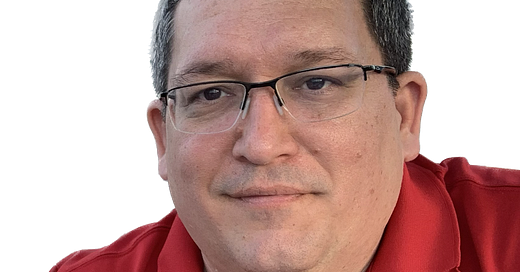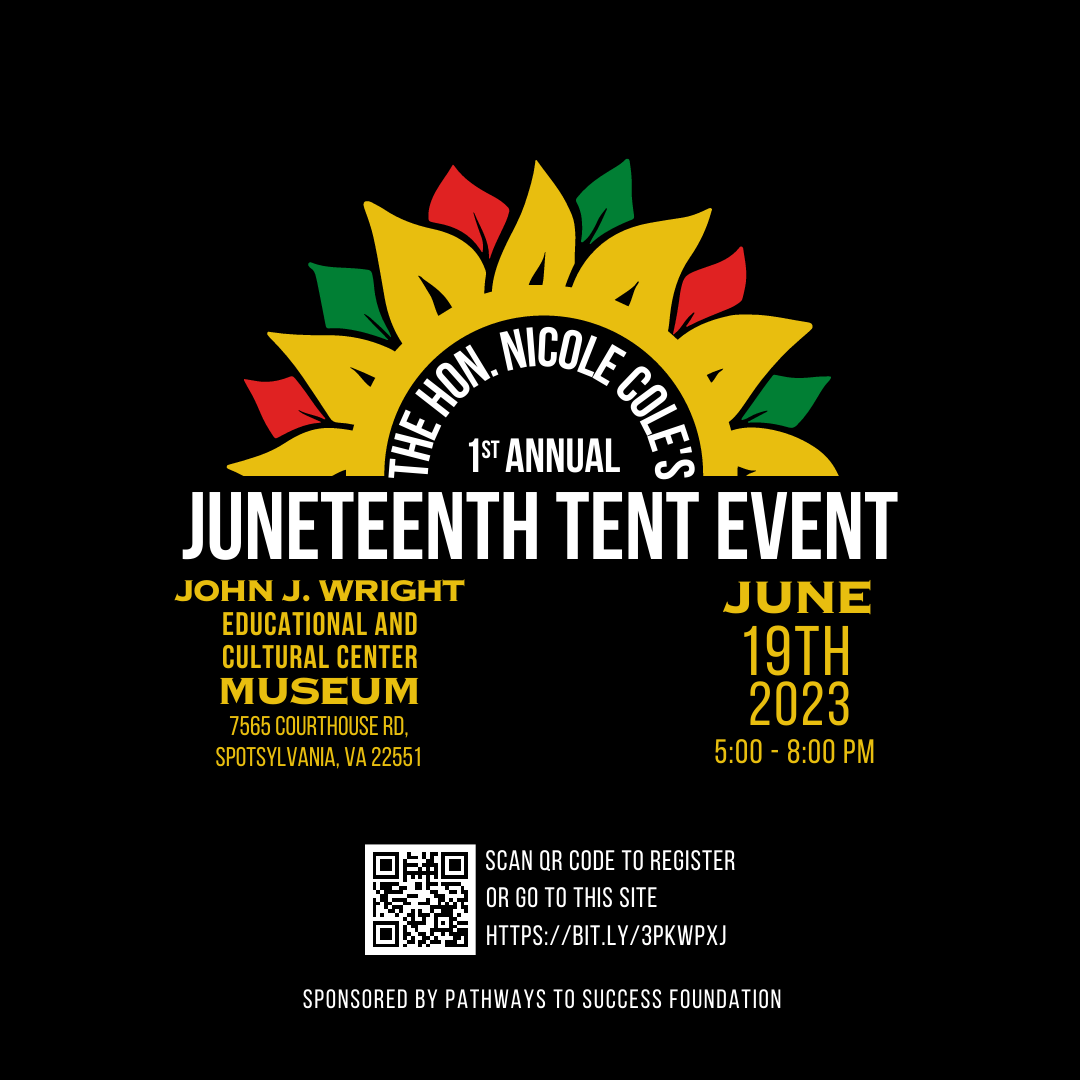Wednesday June 14, 2023
The Why Behind the Why: Chris Yakabouski | Youngkin Administration Strikes a Blow Against Removing Books from Library Shelves | Washington Heritage Museums events | Juneteenth | Share F2S with friends
THE WHY BEHIND THE WHY
An Interview with Spotsylvania County Board Supervisor Chris Yakabouski
This first in a new series, “The Why Behind the Why” is a Q&A with public officials and community leaders. Our aim is to give our readers an opportunity to get to know those who lead and shape the region in a more-personal way.
Know someone we should interview? Want to be considered for an interview yourself? Write the editor at editoratF2S@gmail.com.
Q: How long have you been involved in Spotsylvania politics?
A: I got involved in Republican politics in the mid-90s, when I was 20 or 21. A friend of mine’s father was on the board, and I would go to meetings and meet board members and others.
Q: And when did you first run for office?
A: This year marks the 20th anniversary of my first run for local office.
In 2003 I ran for the Board of Supervisors and won. I served until 2007, when I decided not to pursue re-election, and instead run for the state senate. I lost that race. It was at this time that the board decided to go to staggered terms. So two years later (2009) the Battlefield district seat was up again. I ran and lost. I ran again in 2013, won, and have been on the board ever sense.
I don’t think I’m less conservative now than when I first came on the board. What I understand now, however, is that not everyone is conservative. If someone is not, I’ve learned you need to communicate to find out where you overlap and agree. Then you have a starting point to build from.
Q: When you came on the BOS, Spotsylvania, like Stafford and Fredericksburg, was at the beginning of a growth boom that is ongoing. What’s changed, and what’s not changed in your time?
A: A lot hasn’t changed.
Consider this interesting tidbit about population. We came up with the idea [early in my tenure] that if we could keep growth to 2%, we could manage our budgets and infrastructure growth. We’re currently at 1.4% or 1.5%, and we still can’t do it.
Among the things that have changed was our sheriff’s office modernizing. We started to get away from an all-volunteer fire department, and now we have full 24-7 paid firefighters. We still have volunteers, but they are supplementing our full-time fire fighters, as opposed to being the people we lean on exclusively. All of this, of course, drives costs up.
Q: What about your role on the BOS do you think people least understand?
A: For board members in general, people don’t get that this is a part-time job. We return our own phone calls, answer our own emails, it really is us doing it. It is a sacrifice. The amount of money that you’re paid to do it is not equal to the amount of time and effort you put into it, and the amount you take away from making money in your regular job, too.
Q: What do you do for a living?
A: I am a contractor doing remodeling for most everything, except new homes.
Q: When you came on in 2003, you were seen as one of the more-conservative people on the board. Today, you have a reputation as being a very fair-minded person who works across the aisle. How have you changed?
A: Everyone changes, of course, but I don’t think I’m less conservative now than when I first came on the board. What I understand now, however, is that not everyone is conservative. If someone is not, I’ve learned you need to communicate to find out where you overlap and agree. Then you have a starting point to build from.
I’ve also learned to engage more. Discuss more. I’ve come to respect other people who are genuine. The people that think that know something, perhaps do so because they had bad information. If they get good information, does that change their perception? You can’t do that if you don’t engage.
As you get older, you realize that it’s taken a long time to get to where you are. So to change people’s minds is going to take a lot of time.
From the federal down to the local levels, politics engulf too much of our time, and this bugs me. We should be able to go to concerts and ball games together without politics driving our conversations.
I’m more than happy to work with people if they’re genuine and honest, even if they’re on the opposite side of an issue. I’ll respect you more because you believe in something and you’re fighting for it.
Q: Growth is a contentious issue. How do you approach this issue?
A: I have a philosophy that everything in life is a balance. If a developer wants something changed, that’s fine. I don’t see them as the bad guy, but rather a person doing what they have to do. I, in turn, have to do what I do, which is ensure the county is looked out for and the project is a benefit to the county.
So I have to balance the project against what the county gets. For example, proffers. Developers like to give these, but often they aren’t sufficient to cover the infrastructure a given project is going to end up costing the county.
Q: When you’re not doing county work or running your own business, what do you like to do?
A: Family. We’re really kind of homebodies. We do like to travel and go to concerts, and like a wide range of music. Alternative. Industrial. Metal. Finnish punk. We’re into all kinds of music.
I have no musical talent, and I think that’s why I enjoy listening to people who do have that talent.
I worry that we don’t place enough value on the dignity of work, whatever it is. We value the glamorous, but look down our nose at those who don’t work the glamorous positions. We should celebrate anyone who does good work, no matter what it is.
Q: There’s a lot of talk about doing things regionally, but the counties and Fredericksburg are such different areas. Where can we cooperate?
A: The problem with regionalism is that it becomes about personalities who lock heads and clog things up for a while. I try and get beyond that and work with the localities and take the personalities out of it.
Consider the river crossing. Does it help Spotsy? Maybe. Does it help our two neighbors and the region? If yes, then why not support them?
The hope then becomes that Stafford and Fredericksburg would do the same for us when we need something.
We currently work with the city on water and sewer, animal control; the city and Stafford work together on Parks and Rec, as well as trash. So we do work cooperatively on a number of issues.
Q: What would you do to help the next generation of leaders?
A: Impart to them the importance of local, versus state and federal, government. Federal is sexy, on TV, and you get paid lots of money. The further you go down the rungs, the less glamorous it becomes. But the work becomes more important as you go down the rungs, because it becomes more operational the closer you get to the people you represent.
Also, I encourage people not to look at local government as a springboard to the next thing. Don’t shy away from something because you fear it will cost you votes down the line.
Q: You appear to be a very centered person. Where does that come from?
A: Well, first and foremost, I’m a Christian. That’s what grounds me. What guides me are my parents, who are still with me. That’s where a lot of the wisdom comes from.
Finally, I’ve learned that being grounded is tied in to just doing, and learning.
I worry that we don’t place enough value on the dignity of work, whatever it is. We value the glamorous, but look down our nose at those who don’t work the glamorous positions. We should celebrate anyone who does good work, no matter what it is.
I really love what I do. I never grew up thinking I would do this.
When I ran again in 2013, I was going door-to-door, and there was a lady in a cul-de-sac who asked if I could get a broken street sign on her road fixed. When I got elected, I made it a priority to get that taken care of.
She sent me a wonderful letter thanking me.
That street sign to that lady was the most important thing in her life at that moment. Being able to get that done for her was very satisfying. And it’s a great feeling to have gotten something done for someone else.
ANALYSIS: Youngkin Administration Strikes a Blow Against Removing Books from Library Shelves
by Martin Davis
Observers of the book-banning movement in Spotsylvania County often hear from those who support so acting - like Superintendent Mark Taylor and several people who speak in public comments at Spotsylvania County School Board meetings - express some version of the same mantra.
New state laws, in particular § 22.1-16.8 and of § 2.2-2827 give us the power to ban instructional materials, including those in libraries, if deemed pornographic.
Editor’s Note: We covered the way Taylor hides behind these laws in our April 22 issue.
On June 8, however, none other than Dr. Lisa Coons, Superintendent of Public Instruction in Gov. Glenn Youngkin’s Department of Education, undercut this argument. (The link to download the Superintendent’s Memo follows.)
“Under current law,” she writes, “parents are permitted to see the library materials in school libraries and can opt their children out of library services or particular topics, including graphic sexual content.”
However, she continues:
This law does not require library materials to be defined as instructional materials…. [Emphasis added]
She then goes a step further and lists eight bills that were introduced relating to the labeling of library materials that did not pass. This list includes bills by local politicians Bobby Orrock (HB1448); Nick Freitas (HB1803); and Tara Durant (HB1903)
Nathan Sekinger, president of the Virginia Association of School Librarians, told F2S: “This [Superintendent’s Memo] is a ray of hope. VASL and the ACLU have looked at this model policy language in the VDOE guidelines and agree that a few school districts are misreading it.”
The memo does make clear that “instructional material definitions are made at the local level,” but this is a far cry from standing on these laws to justify your actions.
The Tragedy of Taylor’s Heavy-handedness
Taylor, and the very few parents who continue to insist that pornography abounds in school libraries, are not just misreading how these new laws were meant to be applied. They are trampling over the due processes that exist in every school district in Virginia to deal with controversial materials.
Of the titles that have been removed from shelves for no other reason than Taylor wants them gone, all went through the approved review processes and were deemed by a committee of parents and administrators to be acceptable for placement on library shelves.
By standing on these new laws to defend their actions, what Taylor and others have done is to create a false paradigm on the issue of books. Either you agree that any book they define as pornography is pornographic, or you become a defender of putting pornography on school shelves.
This [Superintendent’s Memo] is a ray of hope. VASL and the ACLU have looked at this model policy language in the VDOE guidelines and agree that a few school districts are misreading it.
Except no one is defending pornography. Especially school librarians.
“I don’t see pornography in my library,” says Sekinger, “and if there was, I would remove it. As a professional school librarian with training in my field, it is my job to curate what is in this library.”
Asked how he would respond to those who stand up in school board meetings and read explicit passages, and then use those passages as an excuse to ban an entire book, Sekinger replied:
“Selections are being cherry-picked from books, which goes against how we are trained to review a work - as a whole.”
This aside, the real damage that Taylor and those like him are doing is to functionally destroy public schools that they claim they are trying to strengthen.
“If the role of the parents right perspective is to create strong systems,” Sekinger says, “this is not the way to go about it. It’s about one-on-one conversations between parents and teachers.”
Conversations that Sekinger says he has all the time in his school, as does every other school librarian.
Now that Youngkin’s own Department of Education has made clear that people like Taylor are misusing these laws, can we expect change?
Don’t bet on it.
Taylor is expert only at cherry-picking what he wants to see. Not understanding issues in their broader context.
Washington Heritage Museums - Upcoming Events
Twilight History
July 31-August 3, 6-8pm
$115.00 per registrant, $95 for WHM members
Explore some of the area's most precious historic sites; the Hugh Mercer Apothecary Shop, the Rising Sun Tavern, the Mary Washington House...and now for the FIRST time, the Mary Washington Monument. This a perfect chance for parents to enjoy downtown Fredericksburg while we educate children ages 8 to 12 with hands-on 18th-century skills, trades, and recipes.
Did you know...WHM members get $20 off each registrant! Consider enrolling your camper as a Scholar level member ($25) entitling your camper and one additional household member to the benefits of membership, including discounts and early access to events for one full year. Join today - it's like receiving a Scholar membership for only $5 and allows your student to enjoy history all year long! Current members, check your email or call 540-373-5630 for the discount code.
Participants must be aged 8 to 12 years.
Questions: 540-373-5630 or youthprograms@WashingtonHeritageMuseums.org
To register: https://washingtonheritagemuseums.networkforgood.com/events/55346-twilight-history-2023
The Mary Washington House During The Civil War
Sunday, June 25, 2023, 6-6:45pm, 6:45-7:30pm
Mary Washington House
$12, $10 for members
During the Civil War, soldiers from both sides visited the Mary Washington House as visitors and to convalesce from injuries sustained in battle. They were all aware of the site's history and used their visit to bolster their patriotism for their side. During the Battle of Fredericksburg in December 1862, the Mary Washington House was not spared from the ravages of war and sustained minor damage. Learn about the residents of the site, free and enslaved, and how the Civil War left its mark on the home of Mary Washington. Tickets are nonrefundable.
Questions: 540-373-1569
To register: https://washingtonheritagemuseums.networkforgood.com/events/57334-the-mary-washington-house-during-the-civil-war
Juneteenth in Spotsylvania
Over the past decade, Juneteenth has grown in the public imagination. What was an unknown event even to many Black people 10 years ago, is now growing into a celebration that is rightfully taking its place along July 4 in the pantheon of American celebrations of freedom.
Learn more about Juneteenth and its history from this National Geographic story.
This year, one of the region’s largest celebrations will be held at the John J. Wright Educational and Cultural Center Museum in Spotsylvania County. Scan the QR code in the image above, or visit the website, to learn more and to join in the activities.
A Special Word to Our Readers
Since leaving the Free Lance-Star in January, a great deal has happened not only in my life, but in our region’s media consumption. F2S has made remarkable jumps in readership in a very short time. We’ve begun adding staff. We’ve launched a podcast with our partner Shaun Kenney. And we are playing a major role in our local civic square through debates and promoting events such as Juneteenth.
These changes have created some unique opportunities, and we’ll have much more to say about this in coming months.
As we ramp up our work, help us spread the word about F2S by inviting a friend to join.
Our material is free to any readers who want to access it, so no one has to pay to read what we provide. We are enormously grateful to everyone who does support us, however. (And we have some plans to thank those people this summer - so watch your emails!)
Pass along this link (https://thelocalburg.substack.com/p/welcome-to-f2s), or the following QR code, and ask folks to sign up.
Share






